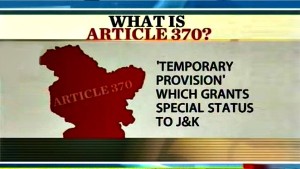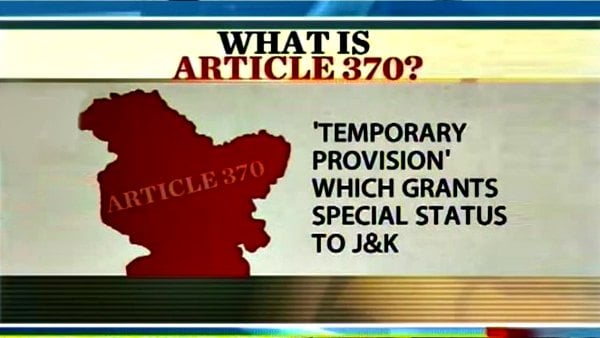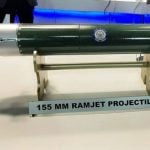Warm greetings to all the ardent followers of our website, keeping the recent happenings in mind, it is imperative that we throw some light on this rather sensitive topic of Article 370 pertaining to the state of Jammu and Kashmir. There have been many doubts and conjectures regarding the current state of the article 370 and its implications. Today we will try to put all those doubts to rest and come out with a clearer perspective.
What is Article 370
As we all know that the Indian constitution contains many articles which direct the laws of our nation. The 
What is Article 370 : PROVISIONS
- Except for Defense, Foreign Affairs, Finance and Communications, the Indian Government needs the State Government’s nod to apply all other laws.
- The central govt. has no power to impose financial emergency in the state. Emergency can be imposed only on the grounds of internal disturbances and imminent danger from a foreign enemy.
- Therefore, the state government has the control on how it needs to govern the state without worrying about the consent of the central government.
- Due to this article, Indian nationals belonging to other states cannot buy land or property in the state of J&K.
- Woman who marries a person belonging to any other state loses her right to ownership; however this is a contentious matter.
What is Article 370 : CURRENT STATUS
On 5 August 2019, Home Minister Amit Shah announced in the Rajya Sabha (upper house of the Indian Parliament) that the President of India had issued The Constitution (Application to Jammu and Kashmir) Order, 2019 (C.O. 272) under Article 370, superseding the Constitution (Application to Jammu and Kashmir) Order, 1954. The order stated that all the provisions of the Indian Constitution applied to Jammu and Kashmir. Whereas the 1954 order specified that only some articles of the Indian constitution to apply to the state, the new order removed all such restrictions. This in effect meant that the separate Constitution of Jammu and Kashmir stood abrogated. The President issued the order with the “concurrence of the Government of State of Jammu and Kashmir”, which apparently meant the Governor appointed by the Union government.
WHO CAN REPEAL THE ARTICLE 370?
Immediately after placing the Presidential Order 2019 before the Rajya Sabha, Home Minister Amit Shah moved a resolution recommending that the president issue an order under article 370(3) rendering all clauses of Article 370 inoperative. After the resolution was adopted by both houses of the parliament, the president issued Constitutional Order 273 on 6 August 2019 replacing the extant text of Article 370 with the following text:
370. All provisions of this Constitution, as amended from time to time, without any modifications or exceptions, shall apply to the State of Jammu and Kashmir notwithstanding anything contrary contained in article 152 or article 308 or any other article of this Constitution or any other provision of the Constitution of Jammu and Kashmir or any law, document, judgement, ordinance, order, by-law, rule, regulation, notification, custom or usage having the force of law in the territory of India, or any other instrument, treaty or agreement as envisaged under article 363 or otherwise.
What is Article 370 : FINAL VERDICT
On 5 August 2019, the Home Minister Amit Shah introduced the Jammu and Kashmir Reorganisation Bill, 2019 in the Rajya Sabha to convert Jammu and Kashmir’s status of a state to two separate union territories, namely Union Territory of Jammu and Kashmir and Union Territory of Ladakh. The union territory of Jammu and Kashmir was proposed to have a legislature under the bill whereas the union territory of Ladakh is proposed to not have one. By the end of the day, the bill was passed by Rajya Sabha with 125 votes in its favour and 61 against (67%). The next day, the bill was passed by the Lok Sabha with 370 votes in its favour and 70 against it (84%). The bill became an Act after it was signed by the president.
The two union territories are scheduled to come into existence on 31 October 2019.
This was all about the article What is Article 370. I hope you have got the gist of the things mentioned. For more such insightful articles, keep visiting SSBCRACK, JAI HIND













